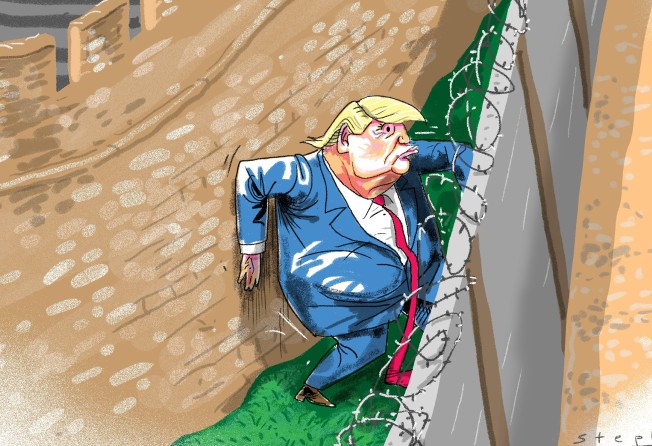Donald Trump caught between his wall and a hard place – China. And Beijing is watching his negotiations very closely
- Robert Boxwell says Trump is stuck. If he strikes a deal with Beijing, it may hurt his re-election chances in 2020. If he doesn’t, Wall Street will punish him. Meanwhile, Beijing is monitoring his border wall negotiations, to see if he will sell out

While Americans focus on President Donald Trump’s negotiations over the Mexico border wall, negotiations over his other wall – trade with China – carry on less raucously. If he thinks getting to “yes” on the Mexico wall is hard, just wait until he tries getting to “yes” on trade with Beijing. He loses with his base if he makes a deal, and he loses with Wall Street if he doesn’t. Either way, it’s a no-win situation for the United States.
Promises to fix the border with Mexico and trade with China were arguably the cornerstones of Trump’s presidential campaign, which yielded many votes for him in 2016. Failing to deliver on either may doom his re-election in 2020. Then again, what success in the trade war means depends on who you’re asking.
No deal is probably the preferred outcome in the eyes of his base, and may be the better outcome for much of the country – indeed, for liberal democracy everywhere – in the long run. But Wall Street, Silicon Valley and others who make a living from US-China trade would all like to get back to making money.
Beijing says Trump started the trade war when he imposed tariffs on a range of Chinese goods last year. Many Americans, and not just Trump supporters, believe a different story – that China had launched a quiet, non-military assault on the US years ago.
This economic war caused substantial harm to millions of American workers and many US businesses, but because it involved no shooting, and because the country’s business elite profited from it, presidents from Bill Clinton to Barack Obama never mounted a defence.
Trump did, and the world started taking a close look at China’s trade practices. Read the comments sections of articles on the trade war and you may find even diehard Trump haters grudgingly giving him credit for standing up to Beijing. Even among readers of the liberal papers Trump so loathes, “I really don’t like the guy, but…” comments are not uncommon.
His tweets indicate he seems to want a trade deal, or credit for one anyway. But his base would probably give him more credit if he could walk away.
Beijing has made multiple promises to give market access to US companies and to protect their intellectual property since George H.W. Bush’s administration first pushed the issue in 1992, but these have constantly come up short.
And over time, what the US calls Chinese state-sponsored theft of US intellectual property has grown into a national security issue. Accepting yet another promise from Beijing to change its trade behaviour would make Trump, in the eyes of his base, just another naive president or a sell-out.
But if he walks away from a deal and slaps additional tariffs on China as he has threatened to, Wall Street – the stock market – will punish him. And who knows what that might mean for his re-election.
No matter what he does, the US is going to suffer. If he increases tariffs and continues the decoupling of the two countries’ economies, it’s practically inconceivable that Americans won’t feel some economic pain. People all over the world will.
But if he accepts Beijing’s terms and declares victory, and the two sides go back to something resembling business as usual, Washington is effectively going to keep “giving wings to a tiger to strengthen it” – which is exactly what the Chinese called the US’ Soviet Union policy way back in 1978.
To Trump’s supporters, the US has been feeding a new tiger, China, for a quarter of a century now, and the new tiger doesn’t seem to envision a world where Western liberal values will have much of a place.
Since Xi Jinping came to power in 2012, China has reversed what many Western trading partners chose to see as slow but steady progress towards economic and, maybe, political reform. This progress was a boon to those in the US who supported trade with China.
Now a broad bipartisan swathe of lawmakers, businesspeople, and academics are viewing Beijing through a new lens.
As they see it, China’s militarisation of its artificial islands in the South China Sea, the gradual erosion of Hong Kong’s freedoms, state-sponsored cybertheft, and what Beijing calls “vocational training centres” for an estimated 1 million Muslims in Xinjiang have all added doses of sobriety about where China is heading.
And recent events – the detention of Canadian citizens in apparent response to Canada’s arrest of Huawei’s Meng Wanzhou, the suggestion by a Chinese admiral that China should sink a couple of US aircraft carriers and kill thousands of US servicepeople, and the veiled threat by Xi to take Taiwan by force – create the impression that Beijing isn’t interested in fitting in with the Western international system that has largely contributed to peace and prosperity around the world since the end of the second world war.
Nobody outside the US is watching the Mexico wall negotiations more closely than China. Beijing is weighing Trump’s fortitude, trying to assess whether he has the ultimate tool in the dealmaker’s toolbox – the ability to walk away from a bad deal – or whether he’ll cave in, like those before him but then tweet about a “victory”.
The US loses something either way. Whether it’s short term and economic or long term and societal depends on Trump.
Good luck sleeping tonight.
Robert Boxwell is director of the consultancy Opera Advisors